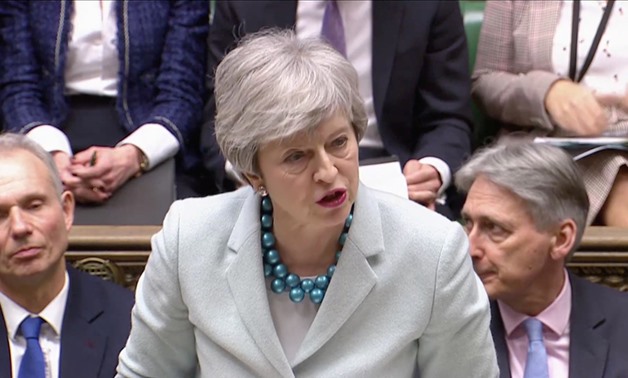
British Prime Minister Theresa May delivers a statement in the Parliament in London, Britain March 25, 2019, in this still image taken from video. Reuters TV/via REUTERS
LONDON - 25 March 2019: British Prime Minister Theresa May admitted on Monday she did not have the backing to pass her European Union withdrawal deal as some in her party called on her to quit and parliament plotted to wrest the Brexit process away from her government.
At one of the most important junctures for the country in at least a generation, British politics was at fever pitch and, nearly three years after the 2016 EU membership referendum, it was still unclear how, when or if Brexit will take place.
With May weakened, ministers lined up to insist she was still in charge and to deny any part in, or knowledge of, a reported plot to demand that she name a date to leave office.
Amid the chaos, it was unclear if or when May would bring the divorce deal she agreed with the EU back to parliament. The deal was defeated in parliament by 149 votes on March 12 and by 230 votes on Jan. 15.
"It is with great regret that I have had to conclude that as things stand there is still not sufficient support in the House (of Commons) to bring back the deal for a third meaningful vote," May told members of parliament (MPs).
Last week, the EU agreed to delay Britain's original March 29 departure date because of the deadlock in London. Now, it will leave the EU on May 22 if May's deal is approved by parliament this week. If not, it will have until April 12 to outline its plans.
May refused to give up on her deal passing eventually, noting that the alternatives were unpalatable to her and that there was no evidence of a majority in parliament for anything except the principle of avoiding an abrupt 'no-deal' exit.
"'NO BREXIT' MUST NOT HAPPEN"
"Unless this House agrees to it, 'no deal' will not happen. 'No Brexit' must not happen," May said.
She said another referendum, a new agreement, or not leaving the EU were among the alternatives that had no majority.
The bottom line remained that if her deal and 'no deal' were rejected, Britain would have to seek a longer delay to Brexit.
"And a 'slow Brexit', which extends Article 50 beyond May 22 May, forces the British people to take part in European Elections and gives up control of any of our borders, laws, money or trade, is not a Brexit that will bring the British people together," May said.
With speculation swirling around her future, parliament prepared to try to seize control of the Brexit process from the government in a series of votes due from 10 p.m. (2200 GMT).
May said such a move would set an unwelcome precedent and the government would oppose it.
However, a government source said a majority of MPs were likely to back Conservative lawmaker Oliver Letwin's amendment, which seeks to change the rules of parliament on March 27 to provide time for lawmakers to debate and vote on different Brexit options.
Parliament Speaker John Bercow will announce at about 1700 GMT whether he has selected any amendments to be voted on.
The EU believes a 'no-deal' Brexit is increasingly likely.
"We don't want a no-deal Brexit, we'd much rather have the Withdrawal Agreement, but if it is to be a no deal, let's do it quickly," an EU official said.
"NATIONAL EMBARRASSMENT"
Opposition Labour leader Jeremy Corbyn said May's approach to Brexit had become "a national embarrassment" that risked causing a no-deal Brexit.
Earlier, May's divided cabinet of senior ministers met to discuss a way forward. Some reports said ministers had "war-gamed" a parliamentary election.
One way to counter parliament would be for May to try to offer her own version of so-called indicative votes. The prospect of a softer Brexit would also increase pressure on the Brexit-supporting lawmakers in her party to get behind her deal.
To get her deal passed, she must win over at least 75 MPs who voted against her on March 12 - dozens of rebels in her Conservative Party, some opposition Labour Party MPs and the Northern Irish Democratic Unionist Party (DUP), which props up her minority government but has voted against the deal so far.
May had a call with DUP leader Arlene Foster after the cabinet meeting on Monday morning, but a DUP spokesman said he did not see the party supporting the deal in a third vote.
The DUP's deputy leader Nigel Dodds said May should have been prepared for a 'no-deal' departure.
"The prime minister has known for some considerable time ... that March 29 was the target date," he said. "Why do we need another two weeks? What's going to happen in another two weeks that couldn't have happened up to now?"
To hold a vote on May's deal on Tuesday, the government must present an emergency business motion by the close of business on Monday.


Comments
Leave a Comment